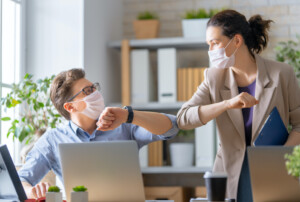
Listen to our full interview with Edovo founder, Brian Hill, here
For entrepreneurs looking to create a positive influence in the social impact space, finding ways to work with neglected and abandoned sectors of the population is never easy, though certainly a necessity. Brian Hill, the CEO and founder of Edovo, has been working for the past five years in helping to disrupt the prison industry through finding innovative solutions to bring educational content to the over 12 million people who cycle through the prison industry each and every year.
What is wrong with the Prison Industry?
The United States incarceration is rate is easily the highest in the world with 716 people per 100,000 residents incarcerated. For comparison´s sake, the United States holds about 4.4 percent of the world’s population, yet it houses 22 percent of the world’s prisoners. While there are structural problems and underlying issues related to why certain sectors of the population are incarcerated, the prison population suffers a number of challenges once they find themselves within correctional institutions.
According to Edovo, access to education has the ability to decrease recidivism (repeat incarceration) by 43 percent. Unfortunately, shrinking budgets, stricter security controls, and other structural factors mean that most incarcerated individuals simply don’t have access to meaningful educational opportunities and communication with their support network to successfully navigate the path towards successful reinsertion into society.
Furthermore, both private and public prisons suffer from ineffective incentives. In the case of private prisons which represent about 6-8 percent of the total incarcerated population, unhealthy contracts operating in a for-profit model disincentive prisons from taking a proactive approach to helping incarcerated individuals find ways to get their lives back on track. Similarly, public prisons are often an important source of jobs for rural areas leading elected officials to prioritize a steady source of jobs for their constituencies rather than policies and approaches to help incarcerated individuals successfully rehabilitate.
What is Edovo Doing to Disrupt the Prison Industry?
Following from this bleak reality of the prison industry, Edovo´s mission is to help everyone connected to incarceration build better lives. Specifically, they work with prison institutions and facilities to help them provide meaningful rehabilitative programming and affordable communication strategies to the prison population. They have developed a secure tablet technology that is able to deliver free access to educational programming and low-cost communication services. Not only are incarcerated individuals able to find important educational services, vocational training, and cultural content to fill their days and help them plan for a post-incarceration future, but Edovo also provides educational opportunities for cognitive therapy, PTSD issues and other behavioral issues such as anger management.
Their strategy also helps incarcerated individuals to maintain a connection with their support network through improved and more affordable communication services. The benefits of Edovo´s work are multifaceted, including reduced recidivism rates, increased safety in correctional environments, and increased opportunities for rehabilitation.
According to Brian Hill, the prison industry is a significant and large sector of our country´s population, but very few people (and even fewer people in the business world) have been able to tackle the issues that affect millions of people in the prison industry. “There is a reality of having nothing to do that is hard to comprehend,” Brian relates. “There is so much talent and opportunity within the correctional facilities that is untapped.”
When Brian and the Edovo team first began visiting prisons to come up with ideas of how to introduce meaningful educational content, he found the majority of incarcerated individuals spending the majority of their days watching daytime television. “When you see 9,000 guys watching Jerry Springer, you have to ask yourself what we are doing. This doesn’t make sense for anybody.”
Brian believes that “one of the fundamental flaws of the prison system is that we don’t know why we incarcerate people…Is it for safety, punishment or for rehabilitation?” Knowing that answer can help to drive better outcomes. While the prison industry and the reality that incarcerated individuals live through on a daily basis is an extremely complex issue, Brian decided not to settle for simple answers, but to deal with those complexities while navigating the company´s mission to bring meaningful educational opportunities and content to people in the prison industry.
Changing Strategies for Effective Work
When Edovo first began thinking about how to bring educational opportunities to incarcerated individuals, they originally planned on utilizing the existing television sets within prisons and transitioning from low-quality daytime TV to educational programming. The organization quickly learned, however, that incarcerated people would not interact with educational TV programs, but rather needed personalized educational content.
In order to deliver educational content, then, Edovo has had to transform into a multifaceted company. “Today we are an educational content creator and curator, a software developer, we install wireless networks in prisons, develop secure tablets, and we are a communications provider, as well as working as a consultant organization,” Brian mentions. “In order to operate in the prison, we had to do all of that.”
“As an entrepreneur, you need to realize that you´re not right most of the time. You have to expect that you´ll be wrong,” Brian mentions. “It is important to listen to the dynamics of the market and be married to the outcomes.”
Edovo realized that one of the biggest challenges they faced towards their goal of making educational content viable and accessible to prison populations was the ability to allow incarcerated individuals to gain access to technologies where they could find personalized educational content. They worked on developing a minimum viable product that could be sent into jails and focused on developing tablet technology. Once they sold that vision to local sheriff departments, they had to figure out how to make technology conform to prison security protocols.
While they were first laughed out of the room by people who had worked in jails before and understood the challenges, they were optimistic and believed in what they had to offer. “You can’t fake genuine,” Brian says. “We truly believed we could change the dynamic of the market.” Their passion and authenticity not only allowed them to introduce innovative solutions to one of the most difficult to reach populations, but it also played into their funding arrangements. Because almost no investors understand the dynamics of the prison industry, they had to educate investors and create trust. Brian believes that they were able to gain an enormous amount of funding because while “lots of people complain (about the problems in the prison industry), very few people come with solutions that have sustainable and scalable merit.”
Since their first launching of educational tablets into prisons in 2014, they have reached over 100,000 incarcerated people and are currently doubling year by year.
According to Brian, “the problem you have to solve, is not the problem you thought would be there. We wanted to make education available for people incarcerated but the biggest problem was payment and procurement to government agencies.”
He goes on to say that’s “if you would’ve told me that making education possible for jails was through buying a phone company…I wouldn´t have believed you.” Edovo´s experience has taught them prison communications contracts are key for criminal justice reform, and they are intent on proving the merit of that strategy.
Listen to our full interview with Edovo founder, Brian Hill, here
A Few Key Takeaways
- Stay married to the outcome: Entrepreneurs should understand that there is tremendous complexity that comes with working in the social impact space. Instead of settling for simple answers to hard questions, it is important to embrace that complexity and think modularly when developing solutions. “Don’t try to solve it all, or you will fail,” Brian mentions. Rather, focus on creating scalable but modular change that’s will allow future actors and impact companies to tackle the next layer of complexity.
- Educate Investors: When working with marginalized populations or obscure issues, you may need to educate investors to prove to them the worth of the strategy you are proposing. Showing your genuine passion for the work you are doing is a great way to build trust with funders.
- Don´t get stuck on one solution: Rather, be open to finding new problems/issues than the ones you set out to originally “solve”. Flexibility will allow you to respond truthfully to the issues that you encounter.






